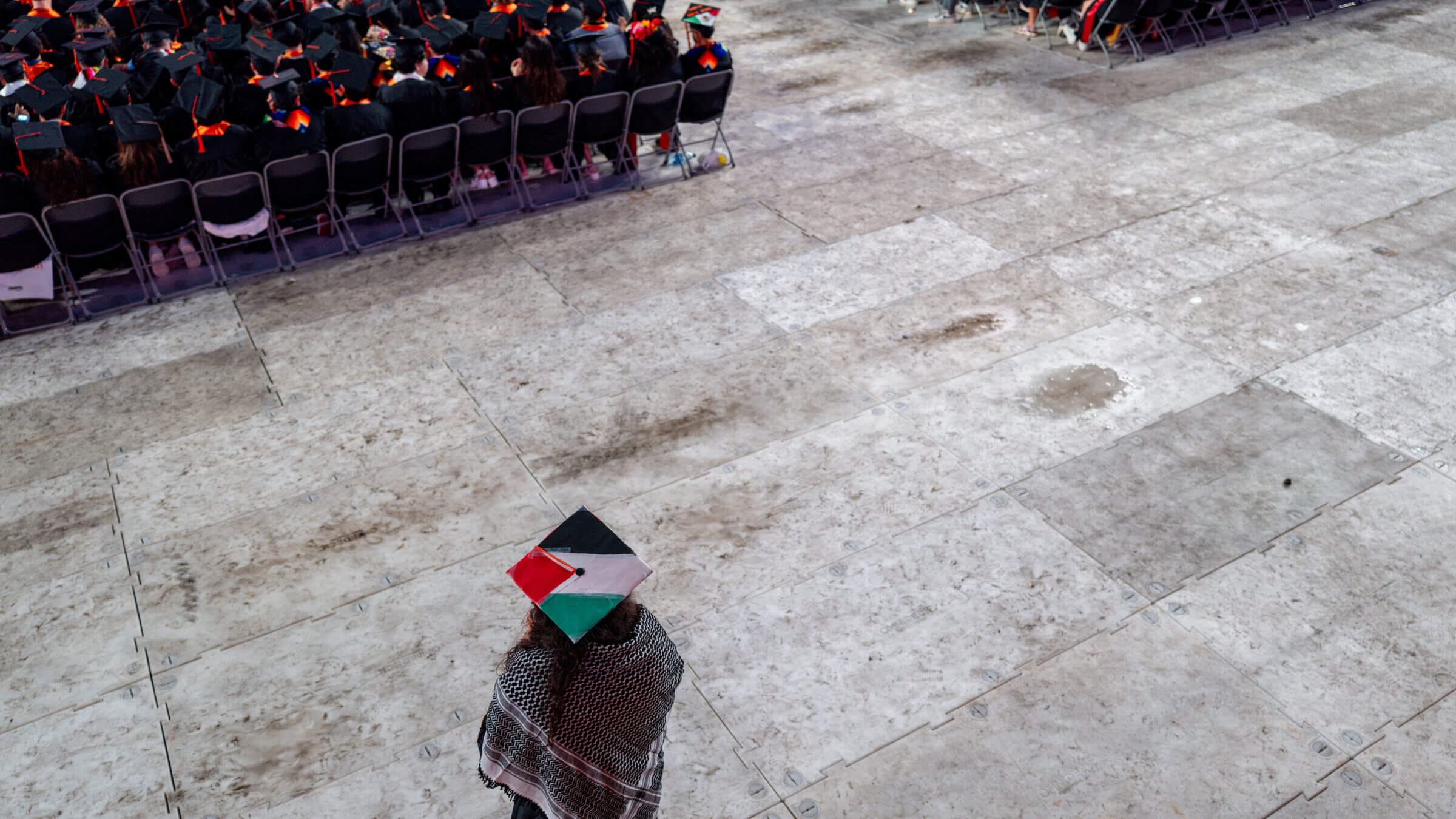Separating anti-Zionists from antisemites on campus
A new study found little overlap between students hostile toward Israel and those hostile to Jews, though the lead researcher says that’s only part of the story

A graduate student pictured during commencement at the University of Texas in May. Photo by Brandon Bell/Getty Images
“Antisemitism Notebook” is a weekly email newsletter from the Forward, sign-up here to receive the full newsletter in your inbox each Tuesday
Two-thirds of college students do not hold views toward Israel or Jews “likely to threaten their relationship with their Jewish peers,” a new study from Brandeis University found.
But what about the remaining third? Researchers found that group split roughly equally between those who expressed hostility toward Israel (but not Jews) and those who thought poorly of Jews (but not Israel).
It represents the second recent study to find that animosity toward Israel is not clearly linked to an embrace of antisemitic ideas — even while these hostile attitudes can alienate them from Jews on campus.
The Brandeis team polled 4,123 undergraduates at 60 schools with a significant number of Jewish students. The academics asked a battery of questions, which you can see the in the chart below, and then using a complex process grouped respondents into one of four buckets: Those not hostile toward Israel or Jews (66% of the total); those hostile toward Israel but not Jews (15%); those hostile toward Jews but not Israel (16%) and those hostile toward both Israel and Jews (2%).
One datapoint that caught my eye is that the students who were more hostile toward Jews than Israel also were more supportive of terrorism against Israel. For example, 24% of the hostile-to-Jews group agreed that “all Israeli civilians should be considered legitimate targets for Hamas,” compared to 6% of those hostile to Israel.
Also: Among the group that agreed with statements including “Jews don’t care what happens to anyone but their own kind,” 66% said that Israel had a right to exist.
These findings track with a study I shared here in March showing that more conservative college students are more likely to support Hamas killing Israeli civilians.
What’s going on here?
So we now have two new studies showing that hardcore anti-Zionists on campus — around 15% of students nationally, according to the Brandeis study — are not especially likely to participate in “consensus antisemitism,” a term that the scholar Keith Kahn-Harris uses to describe ideas that disparage all Jews because they are Jews.
But there’s a similar share of students who do hold those sorts of views — they agree with antisemitic tropes and are more likely support Hamas terrorist attacks — who tend to be more conservative and more supportive of Israel (26% of them had a favorable view of the Israeli government, compared with 21% of the majority of students who were not hostile toward either Israel or Jews).
Some might see these findings as validation of the anti-Zionists’ refrain that their only objection is to the state of Israel, and a comfort to Jews worried that the growing animosity toward Israel will fuel a further rise in antisemitism. Among the anti-Zionists in the survey, for example, only 4% agreed that “Jews should be held accountable for Israel’s actions.”
Len Saxe, the lead researcher on the study, is skeptical. “It’s just a different way of expressing the same old hostility, the same old prejudices,” he said in an interview. “I would call it a new expression of traditional antisemitism.”
But the study may be another signal that while mainstream Jewish organizations have focused in recent years, and especially since Oct. 7, on left-wing threats, there may be an equal — or greater — threat festering among right-wing students.
Alas, the Brandeis study also confirmed a problem I highlighted in last week’s newsletter about the exclusion of “Zionists,” broadly defined, from progressive spaces: Roughly 11% of college students are effectively refusing to socialize with the vast majority of their Jewish peers over disagreements related to Israel.
That ostracism is a serious problem — but it’s more complicated than the simple story we’re often told of protesters who have turned their sights on Israel because they hate Jews, and policymakers trying to address the campus climate would do well to read the Brandeis study in full.
“Maybe we have to be a little less focused on calling out antisemitism,” Saxe suggested when we spoke, “and work harder to actually educate people about who Jews are.”
A message from our Publisher & CEO Rachel Fishman Feddersen

I hope you appreciated this article. Before you go, I’d like to ask you to please support the Forward’s award-winning, nonprofit journalism so that we can be prepared for whatever news 2025 brings.
At a time when other newsrooms are closing or cutting back, the Forward has removed its paywall and invested additional resources to report on the ground from Israel and around the U.S. on the impact of the war, rising antisemitism and polarized discourse.
Readers like you make it all possible. Support our work by becoming a Forward Member and connect with our journalism and your community.
— Rachel Fishman Feddersen, Publisher and CEO





























